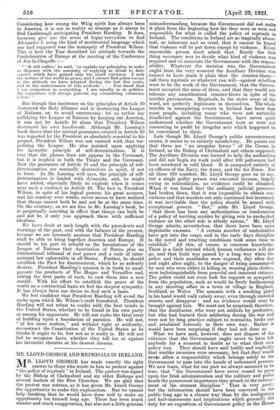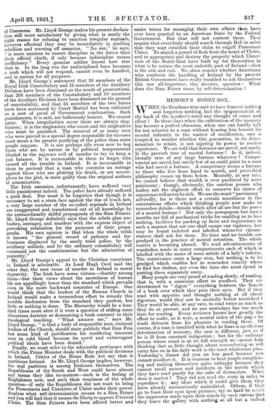MR. LLOYD GEORGE AND REPRISALS IN IRELAND.
MR. LLOYD GEORGE has made exactly the right answer to those who wrote to him to protest against "the policy of reprisals " in Ireland. The protest was signed by the Bishop of Chelmsford and six other Bishops and several leaders of the Free Churches. We are glad that the protest was written, as it has given Mr. Lloyd George the opportunity to make this explanation. But we cannot help thinking that he would have done well to make an opportunity for himself long ago. There has been much slander and much exaggeration, but also not a little genuine misunderstanding, because the Government did not make it plain from the beginning how far they were or were not responsible for what is called the policy of reprisals in Ireland. The conditions in Ireland are so tragically abnor- mal, so infamous and so cruel, that it cannot be hoped that violence will be put down except by violence. -Every reasonable person must admit that Surely the first thing necessary was to decide what kind of violence was required and to associate the Government with the respon- sibility. Whatever ,the decision was, the Government ought from the very moment the Auxiliary Division was formed to have made it plain that the counter-blows- call them reprisals or whatever you will—against rebellion were to be the work of the Government, that the Govern- ment accepted the onus of them, and that they would not tolerate any unauthorized counter-blows in spite of the terrible provocation. Reprisals, in the strict sense of the word, are perfectly legitimate in themselves. The whole trouble in interpreting events in Ireland has been that most people, including many who were not naturally disaffected against the Government, have never quite understood whether the Government were or were not consenting to profit by irregular acts which happened to be convenient to them.
Late though Mr. Lloyd George's public announcement comes, it seems to us entirely satisfactory. He points out that there are " no irregular forces " of the Crown in Ireland, as the Bishop of Chelmsford and others supposed. The Auxiliary Division was formed to help the authorities and did not begin its work until after 100 policemen had been murdered in cold blood. It is composed entirely of ex-officers of the Navy, the Army, and the Air Force. For all those 100 murders, Mr. Lloyd George goes on to say, not a single guilty person was executed because, largely owing to intimidation, no evidence could be obtained. When it was found that the ordinary judicial processes had broken down, that it was impossible to obtain con- victions and that murders not only continued but increased, it was inevitable that the police should be armed with exceptional powers. " But, adds Mr. Lloyd George, " that there has been any authorization or condonation of a policy of meeting murder by giving rein to unchecked violence on the other side is utterly untrue." Mr. Lloyd George admits, nevertheless, that there have been some deplorable excesses. " A certain number of undesirables have got into the corps, and in the early days discipline in the novel and exacting conditions took some time to establish." All this, of course, is common knowledge. There is a limit beyond which human endurance will not go, and that limit was passed by a long way when the police and their auxiliaries were exposed, day after day and night after night, to the danger of being assassinated by men who were either in hiding or, wearing plain clothes, were indistinguishable from peaceful and innocent citizens. The police could not even look for support or sympathy from the population, such as would be freely forthcoming in any shooting affair in a town or village in England, Scotland, or Wales. The assassin with a. smoking pistol in his hand would walk calmly away, even through crowded streets, and disappear ; and no evidence would ever be brought against him. We must not be surprised, therefore, that the Auxiliaries, who were not soldiers by profession, but who had learned their soldiering during the war and were not by long practice subject to restraints, broke out and retaliated furiously in their own way. Rather it would have been surprising if they had not done so. What we have said, however, does not dispose of the criticism that the Government ought never to have left anybody for a moment in doubt as to what their own policy was. They should have said boldly and explicitly that warlike measures were necessary, but that they would never allow a responsibility which belongs solely to the Government to pass into the hands of unlicensed persons. We now learn, what for our part we always assumed to be true, that " the Government have never ceased to press upon the Irish administration and the military and police heads the paramount importance they attach to the enforce- ment of the sternest discipline." That is very good but the information should have been conveyed to the public long ago in a clearer way than by the ambiguities and half-statements and implications which generally did duty for an exposition of Government policy in the House of Commons. Mr. Lloyd George makes his present declara- tion still more satisfactory by giving what is surely the right reason for refusing to sanction irregular reprisals, however effectual they may be immediately in quelling rebellion and warning off assassins. ".No one," he says, " is more anxious to ensure discipline in the forces than their official chiefs, if only because indiscipline means inefficiency." Every genuine soldier knows how true that is In the long run the undisciplined force becomes a mob which will not respond, cannot even be handled, and is useless for all purposes. Mr. Lloyd George's statement that 28 members of the Royal Irish Constabulary and 15 members of the Auxiliary Division have been dismissed as the result of prosecutions, that 208 members of the Constabulary and 59 members of the Auxiliary Division have been dismissed on the ground of unsuitability, and that 24 members of the two fOrces have been sentenced by Court Martial has been criticized as a sort of proof of Government condonation. Such punishments, it is said, are ludicrously lenient. We cannot agree. When irregularities occur there are always ring- leaders; it is the ringleaders who count and the ringleaders who must be punished. The removal of so many men who were proved in a special degree responsible for excesses must mean a far greater purifying of the police than some people suppose. It is not perhaps idle even now to beg those who are by nature or by political temperament blinded to the supreme evil of murder to try to keep a just balance. It is inexcusable in them to forget who caused all the trouble in Ireland. It is inexcusable in them to pretend that a man who commits an outrage against those who are plotting his death, or are accom- plices to the plot, is more guilty than the original authors of assassination.
The Irish assassins, unfortunately, have suffered very little punishment indeed. The police have already suffered a good deal. Nor must it be forgotten that though it is necessary to set a stern face against the rise of lynch law, a very large number of the so-called reprisals in Ireland are exaggerated and transformed out of all knowledge by the extraordinarily skilful prapaganda of the Sinn Feiners. Mr. Lloyd George definitely. says that the rebels plan am- bushes, outrages, and murders with the express object of provoking retaliation for the purposes of their propa- ganda. His own opinion is that when the whole truth is known "the 'general record of patience and for- bearance displayed by the sorely tried police, by the auxiliary soldiers, and by the ordinary constabulary will command not the condemnation but the admiration of posterity." Mr. Lloyd George's appeal to the Christian conscience in Ireland is admirable. As Lord Hugh Cecil said the other day, the root cause of murder in Ireland is moral depravity. The Irish have some virtues—chastity among them—but their views about the sacredness of human life are appallingly lower than the standard which prevails even in the more backward countries of Europe. One would think that the leaders of the Roman Church in Ireland would make a tremendous effort to remedy this terrible declension from the standard they profess, but little or nothing is done. The Hierarchy would be a hun- dred times more alert if it were a question of stifling some obnoxious doctrine or denouncing a book contrary to their theological teaching. " What amazes me," says Mr. Lloyd George, " is that a body of responsible men, eminent leaders of the Church, should state publicly that Sinn Fein has some kind of justification for murdering innocent men in cold blood because its novel and extravagant political ideals have been denied."
Finally, we must refer to the admirable pertinence with which the Prime Minister deals with the political divisions in Ireland. Critics of the Home Rule Act say that it partitions Ireland. As Mr. Lloyd George implies, however, the real partition is among Irishmen themselves. The Republicans of the South and West could have almost any terms they like to-morrow—such is the feeling of Englishmen now, and such their weariness of the whole cpiestion—if only the Republicans did not want to bring the Protestants and Unionists of Ulster under their power. Analyse what self-determination means to a Sinn Feiner and you will find that it means the liberty to oppress Unionist Ulster. The Sinn Feiners have been offered better and easier terms for managing their own affairs than have ever been granted to an American State by the Federal Government. But that will not content them. They require that everybody should march through Hell in order that they may establish their claim to engulf Protestant Ulster. To snatch a pound of flesh from the heart of Ulster, and to appropriate and destroy the property which Ulster- men of the North-East have built up for themselves in what is by nature the most unfertile part of Ireland—that is the aim and end. We often wonder whether Americans who condemn the handling of Ireland by the present British Government have really troubled to ask themselves this one all-important, this decisive, question : What does the Sinn Feiner mean by self-determination ?



































 Previous page
Previous page